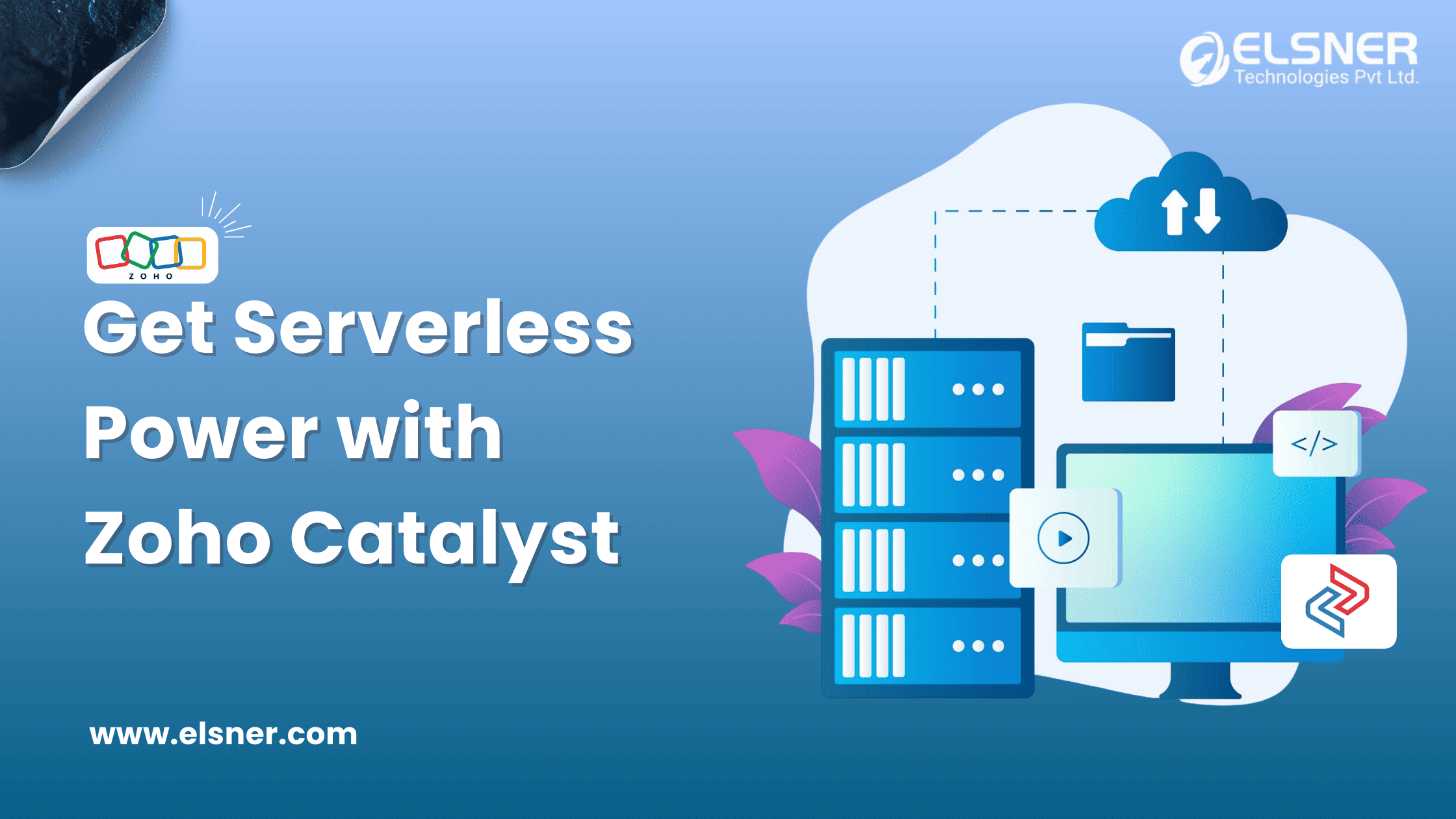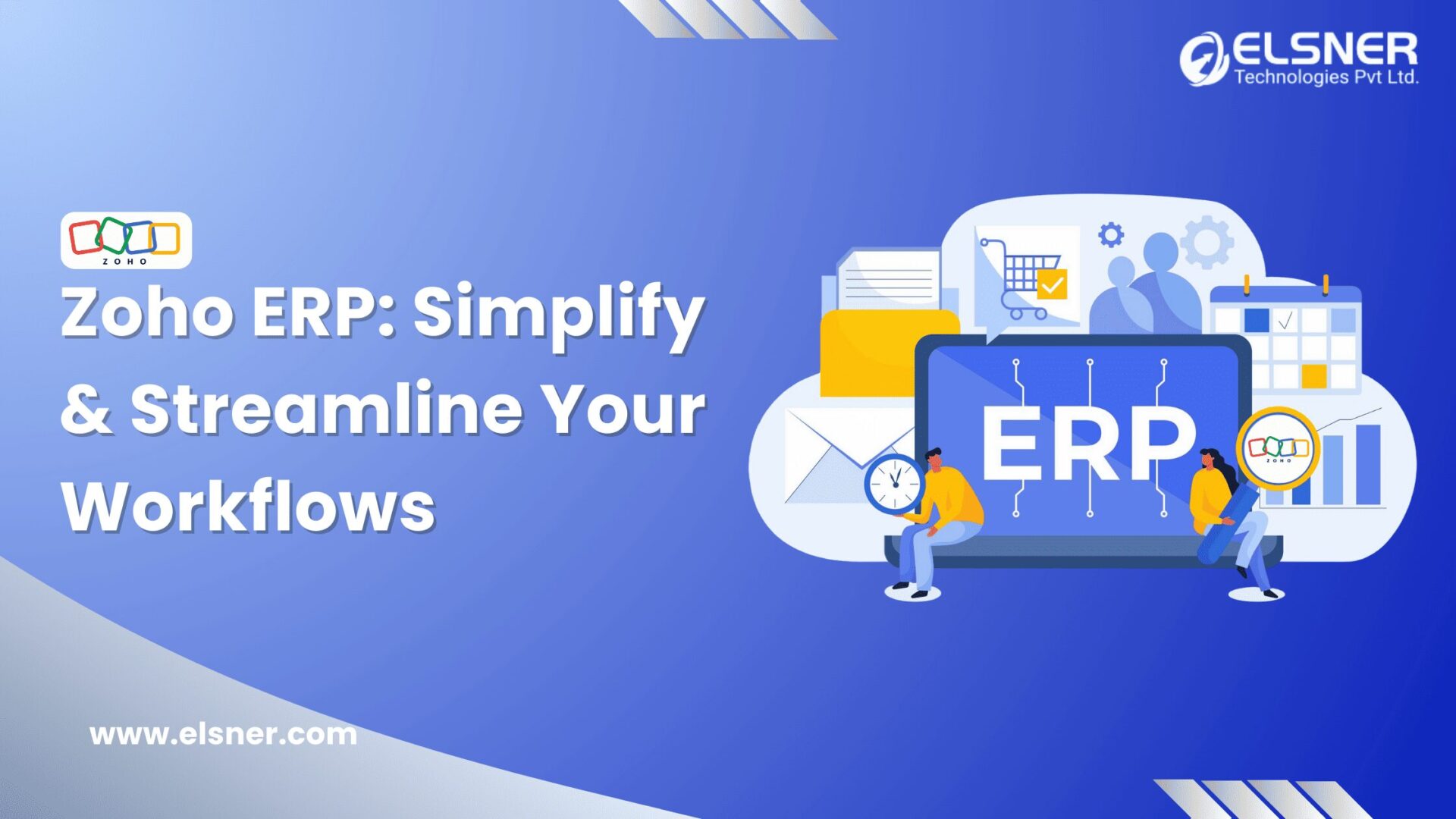- Why Data-Driven Decisions are Considered Non-Negotiable?
- Zoho CRM and Zoho Analytics: The Perfect Pair
- Benefits of Integrating Zoho Analytics with Zoho CRM
- Enhanced Visibility into Sales Metrics
- Improved Forecasting Accuracy
- Personalized Customer Interactions
- Step-by-Step Guide to Integrating Zoho Analytics with Zoho CRM
- Step 1: Preparation for Integration
- Step 2: Configuring Access and Permissions
- Step 3: Data Synchronization
- Step 4: Creating Reports and Dashboards
- Step 5: Sharing Insights
- “Leveraging Zoho for Business”
- Practical Tips for Maximizing Integration Benefits
- Focus on Automation
- Train Your Team
- Regularly Audit Data
- Leverage Advanced Analytics
- Optimize Reports for Decision-Making
- Encourage Collaboration
- Wrapping Up
- FAQs
In the sales world, this specific quote holds particularly true. With evolving customer behaviors as well as market trends, relying on intuition is considered no longer sufficient. Sales success now particularly depends on how well you leverage data to craft actionable strategies.
“In God we trust, all others must bring data,” said W. Edwards Deming, highlighting the irreplaceable role of data in decision-making.
In this particular context, Zoho CRM integration as well as Zoho Analytics integration emerge as indispensable tools for businesses aiming to elevate their sales game. These platforms do not just collect and organize information; they empower teams with insights to make informed decisions. According to a report by Gartner, companies that mainly utilize data-driven sales strategies can increase productivity by up to 30 percent.
Why Data-Driven Decisions are Considered Non-Negotiable?
Sales is not just about closing deals—it is typically about understanding customer needs, predicting trends, as well as optimizing performance. A data-driven approach ensures that every decision aligns with measurable outcomes. Tools like Zoho CRM analytics and Zoho CRM development help businesses analyze patterns, identify growth opportunities, and eliminate inefficiencies.Some core advantages include:
- Better Forecasting: Analytics tools predict sales trends based on historical data.
- Customer-Centric Strategies: Understanding customer behavior leads to tailored sales approaches.
- Improved Team Performance: Sales teams focus efforts based on data insights, maximizing efficiency.
Zoho CRM and Zoho Analytics: The Perfect Pair
When integrated, Zoho Analytics and Zoho CRM provide a holistic view of sales operations. Zoho CRM integration organizes customer data, while Zoho Analytics integration processes this data into actionable insights. This combination creates a seamless ecosystem where businesses can track performance, anticipate market shifts, and adapt strategies in real time.
Organizations looking for tailored solutions can explore Zoho development services or choose to hire Zoho developers or Zoho CRM developers for customized implementation. By doing so, businesses ensure that their systems align perfectly with unique operational needs.
In the following sections, we will explore how to maximize these integrations, leverage advanced features, and drive meaningful sales transformation. If you are ready to embrace smarter strategies and take your sales to the next level, this guide will show you the way.
Benefits of Integrating Zoho Analytics with Zoho CRM
Enhanced Visibility into Sales Metrics
When you integrate Zoho Analytics with Zoho CRM, you open a window to unparalleled sales transparency. Particularly for sales teams and managers, this integration offers precise visibility into every aspect of the sales funnel. With this integration, you can:
- Monitor real-time metrics like lead conversion rates and revenue growth.
- Specifically track performance across different sales territories or team members.
- Access comprehensive dashboards using Zoho CRM analytics to focus on areas needing attention.
Consider this: what if you could identify bottlenecks in your pipeline the moment they occur? Enhanced visibility ensures that your team’s time and resources are optimized, ultimately leading to better outcomes. With Zoho development or Zoho CRM development services, you can further customize these insights to match your unique needs.
Improved Forecasting Accuracy
Predicting sales outcomes is a skill, but with Zoho Analytics, it becomes a science. This integration enables businesses to utilize historical data for generating precise forecasts. Here is what it offers:
- Particularly accurate trend analysis to anticipate seasonal changes.
- Data modeling capabilities to predict future revenue.
- Real-time synchronization ensures that your forecasts reflect the latest updates.
For instance, by analyzing past performance and current trends, you can identify which product lines are likely to perform better next quarter. Such insights are invaluable, especially when setting realistic goals. The added support from Zoho CRM development ensures that your forecasting tools are always operating at peak efficiency.
|
Forecasting Features |
Impact |
|
Historical Data Analysis |
Improves decision-making |
|
Real-Time Sync |
Reflects up-to-date sales conditions |
|
Predictive Analytics Models |
Anticipates future trends |
|
Team-Specific Metrics |
Aligns efforts across departments |
Personalized Customer Interactions
Modern customers expect tailored experiences, and Zoho Analytics combined with Zoho CRM helps deliver exactly that. With this integration, you gain deeper insights into customer behavior and preferences. Here’s how it transforms customer interactions:
- Identify purchase patterns to customize recommendations.
- Use data to segment audiences for targeted marketing.
- Access insights that allow for one-on-one engagement, particularly during high-stakes negotiations.
Imagine knowing your customer’s preferences before your first conversation. This integration allows businesses to approach clients with confidence and empathy, turning one-time buyers into loyal advocates. Zoho CRM integrations provide the flexibility to design campaigns that resonate on a personal level, strengthening relationships at every step.
|
Personalization Benefits |
Customer Impact |
|
Audience Segmentation |
Targeted campaigns |
|
Behavioral Insights |
Enhanced customer satisfaction |
|
Purchase Trend Analysis |
Improved product recommendations |
|
One-on-One Engagement Tools |
Builds loyalty and trust |
By leveraging these advantages, businesses foster relationships that lead to long-term success. The personalization enabled by Zoho CRM analytics truly sets businesses apart from competitors, particularly in saturated markets.
Step-by-Step Guide to Integrating Zoho Analytics with Zoho CRM
Step 1: Preparation for Integration
Effective integration begins with meticulous preparation. Start by outlining your specific business objectives. Are you aiming to streamline data analysis or improve your sales strategy transformation? Typically, identifying these goals in advance helps you focus on the most critical metrics like sales conversions, customer retention rates, or team productivity.
Engage your team to align their understanding with the process. Additionally, consulting Zoho development services can provide insights into best practices, ensuring a smoother transition.
|
Preparation Checklist |
Action Steps |
|
Define Goals |
Identify primary and secondary sales metrics |
|
Gather Resources |
Prepare necessary accounts and credentials |
|
Assign Responsibilities |
Allocate tasks among team members |
|
Consult Experts |
Partner with Zoho CRM integrations specialists |
Step 2: Configuring Access and Permissions
Managing access rights is crucial for data security. Log in to both Zoho CRM and Zoho Analytics to begin setting permissions. Assign roles based on responsibilities within your organization. For instance, managers might need full access, while team members require limited views.
This role-based access system ensures that sensitive information is safeguarded while empowering the right personnel with the tools they need. If this step feels overwhelming, you can hire a Zoho developer for assistance, particularly in configuring complex permissions.
|
Role Type |
Access Rights |
| Manager | Full access to dashboards and data |
| Sales Executive | Limited access to sales metrics |
| Marketing Team | Segmented access for campaigns |
Step 3: Data Synchronization
Data synchronization bridges Zoho CRM and Zoho Analytics, creating a unified platform for your sales strategy transformation. Begin by selecting the data fields to sync, such as customer details, pipeline stages, or revenue figures.
Typically, it is better to automate synchronization to minimize manual intervention and reduce errors. Regularly monitor logs for potential discrepancies. Real-time synchronization ensures your team always has the most current data at their fingertips.
| Synchronization Tips | Benefits |
| Automate Data Sync | Saves time, reduces errors |
| Monitor Sync Logs | Identifies discrepancies early |
| Sync Relevant Fields Only | Keeps the system efficient |
Step 4: Creating Reports and Dashboards
Reporting and dashboards are where the magic of Zoho Analytics Integration truly shines. Begin by identifying key performance indicators (KPIs) that align with your business objectives. Design dashboards to visualize trends and outcomes clearly. Use Zoho CRM analytics tools to build intuitive graphs, heatmaps, and tables that highlight crucial insights.
Customization is particularly important—tailor your visuals to address specific team needs or regional sales data. Update these dashboards weekly for maximum relevance.
| Dashboard Features | Purpose |
| Customizable Graphs | Highlights specific KPIs |
| Interactive Heatmaps | Tracks performance across regions |
| Filterable Views | Focuses on targeted data points |
Step 5: Sharing Insights
Sharing insights fosters collaboration across teams. Use Zoho integrations to distribute reports via email or internal portals. Specifically, consider scheduling automated updates so stakeholders remain informed without manual intervention. For presentations, embed live reports directly into your decks for maximum impact.
By sharing data-driven insights, you empower teams to align their strategies and achieve collective goals. If customization is required, leveraging Zoho development can further streamline this process.
| Sharing Method | Key Advantages |
| Email Distribution | Keeps all stakeholders informed |
| Live Report Embedding | Adds real-time data to presentations |
| Automated Updates | Saves time and ensures relevance |
“Leveraging Zoho for Business”
Zoho development solutions can boost productivity, streamline operations, and scale your business.
Practical Tips for Maximizing Integration Benefits
Focus on Automation
Automation is the secret to saving time and minimizing errors in your sales processes. By using Zoho CRM integration with Zoho Analytics, you can simplify tasks that typically consume hours. Automate follow-up emails, set reminders for your sales team, and ensure customer records update in real-time. Leveraging Zoho development services ensures your automation setup is optimized for efficiency. For example:
| Automation Task | Impact |
| Email Follow-Ups | Reduces manual effort and improves response rates |
| Real-Time Data Sync | Ensures consistency across platforms |
| Automated Notifications | Keeps teams informed of key updates |
Train Your Team
The success of Zoho Analytics integration depends on how well your team adapts to it. Conduct regular training sessions to familiarize your sales team with Zoho CRM analytics. Training ensures they can use the tools effectively for data-driven sales strategies. Encourage active participation by:
- Hosting workshops to explore Zoho Analytics features.
- Offering hands-on sessions to build confidence in using dashboards.
- Providing access to resources created during Zoho CRM development.
Regularly Audit Data
Data accuracy is critical for effective decision-making. Conduct periodic audits to identify outdated or duplicate records. This ensures that the insights generated from Zoho Analytics integration remain reliable. Take these steps:
- Schedule weekly reviews to verify data accuracy.
- Remove duplicate entries using tools provided by Zoho integrations.
- Use Zoho development services for large-scale data cleansing.
Leverage Advanced Analytics
Zoho Analytics integration offers advanced analytics features that drive better sales outcomes. Explore predictive analytics to anticipate customer needs or use geo-analytics to understand regional performance. Advanced tools like cohort analysis allow your team to track customer behaviors over time, creating opportunities for sales strategy transformation. Consider hiring a Zoho developerto customize these features further.
| Advanced Analytics Feature | Benefit |
| Predictive Analytics | Improves planning and forecasting |
| Geo-Analytics | Enhances understanding of regional trends |
| Cohort Analysis | Tracks long-term customer behavior |
Optimize Reports for Decision-Making
Customizable reports within Zoho CRM analytics make it easier to focus on relevant data. Tailor dashboards to highlight KPIs specific to your organization. Update these reports regularly to keep your team aligned with business goals. If required, hire Zoho developers to create reports suited to your unique needs.
| Reporting Element | Purpose |
| KPI Dashboards | Tracks performance metrics |
| Weekly Updates | Keeps insights current |
| Custom Visualizations | Simplifies data interpretation |
Encourage Collaboration
Sharing insights across teams can enhance collaboration. Use Zoho CRM integrations to make reports accessible to stakeholders. Encourage cross-department discussions based on shared analytics. Teams working together can better align efforts for data-driven sales strategies.
By applying these tips, businesses can unlock the full potential of Zoho Analytics and Zoho CRM integration. These practical approaches ensure that your tools not only work effectively but also lead to measurable improvements in your sales performance.
Wrapping Up
Integrating Zoho Analytics with Zoho CRM is more than just a technical upgrade. It represents a deliberate move towards smarter, data-driven sales strategies. Specifically, this integration empowers businesses to transform scattered data into meaningful insights that drive success. Zoho CRM analytics plays a crucial role in helping teams identify patterns, optimize their processes, and achieve higher levels of efficiency. The impact of this integration is not just limited to better data management. It creates opportunities to personalize customer experiences and forecast sales outcomes with unmatched accuracy. Particularly for businesses looking to implement a sales strategy transformation, this combination of tools offers a competitive edge.
Regular updates, team training, and the exploration of advanced analytics are critical steps to fully unlock the integration’s potential. Typically, businesses that invest in these areas see a marked improvement in how they engage with customers and make decisions. If your organization requires deeper customization, hiring a Zoho developer can ensure the system meets your unique needs. In today’s competitive landscape, leveraging the power of Zoho CRM integrations is not optional—it is essential. With consistent effort and the right resources, your sales team will be well-equipped to thrive.
FAQs
-
What is the significance of integrating Zoho Analytics with Zoho CRM?
Zoho Analytics and Zoho CRM integration is particularly valuable for businesses aiming to make decisions rooted in data. This integration creates a unified platform for tracking, analyzing, and acting on sales information.
Typically, it helps teams identify key trends, improve forecasting, and adjust strategies in real time. Zoho CRM analytics simplifies this process, offering tools that transform raw data into actionable insights.
-
How does Zoho Analytics improve sales forecasting?
Zoho Analytics improves sales forecasting by offering advanced features like predictive modeling and trend analysis. These tools specifically help businesses understand historical patterns and predict future sales scenarios.
By integrating with Zoho CRM development, these insights flow seamlessly into your sales processes. Teams can plan more effectively, allocate resources wisely, and set achievable goals.
-
What features does Zoho CRM Analytics offer for IT sales forecasting?
Zoho CRM Analytics provides a wide range of features tailored for IT sales forecasting. These include pipeline analysis, revenue projection, and highly customizable dashboards. IT teams, in particular, benefit from the ability to drill down into data by product, region, or team performance.
This granularity ensures precise forecasting, which is critical in an industry where accuracy directly impacts decision-making.
-
How can sales teams use the insights gained from this integration?
Sales teams can use the insights from Zoho Analytics integration in several impactful ways:
- Personalized Outreach: Insights from Zoho CRM analytics allow teams to craft messages tailored to individual customer preferences and behaviors.
- Targeted Resource Allocation: Regional performance metrics help teams decide where to focus their efforts.
- Improved Collaboration: Teams can share dashboards and reports, particularly through Zoho CRM integrations, to align their strategies across departments.
- Real-Time Adjustments: Access to real-time data helps teams adapt quickly to market changes or evolving customer needs.
By using these insights strategically, teams can significantly enhance their overall performance and deliver more value to their customers.

About Author
Pankaj Sakariya - Delivery Manager
Pankaj is a results-driven professional with a track record of successfully managing high-impact projects. His ability to balance client expectations with operational excellence makes him an invaluable asset. Pankaj is committed to ensuring smooth delivery and exceeding client expectations, with a strong focus on quality and team collaboration.




